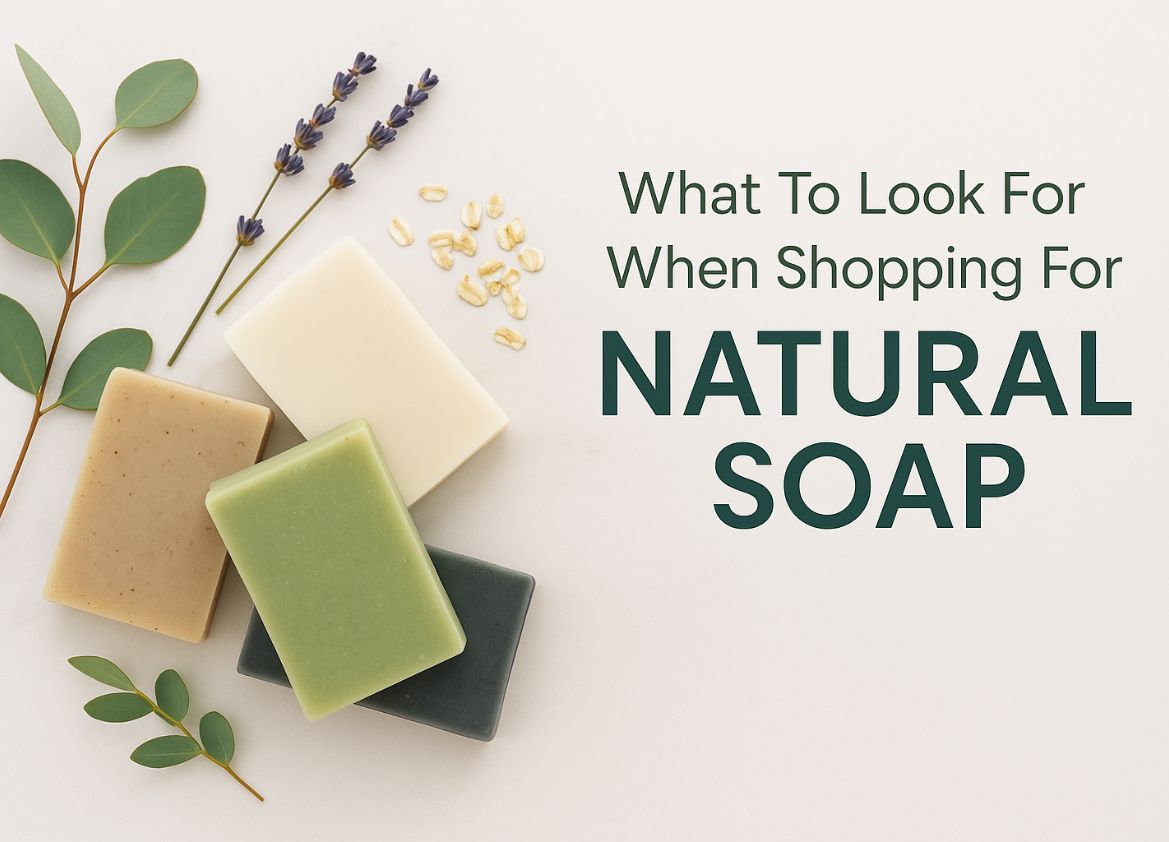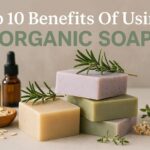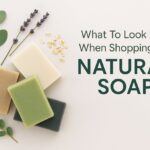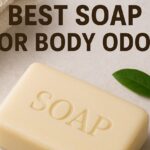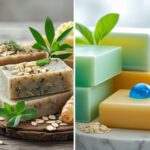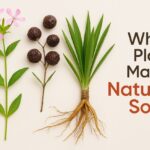If you’ve ever wondered what to look for when shopping for natural soap, you’re not alone. Walk into any store today, and you’ll see dozens of bars claiming to be “all-natural,” “organic,” or “chemical-free.” But here’s the truth: most of them aren’t what they claim to be.
Consumers are waking up to the fact that conventional soaps are loaded with harsh chemicals that strip your skin, harm the environment, and support unsustainable practices. But with this surge comes confusion and plenty of brands ready to cash in on misleading labels.
I’ve spent years helping businesses dominate their markets, and one thing I’ve learned is this: knowledge is power. When you know exactly what to look for, you stop wasting money on junk and start investing in products that actually work.
This guide will show you exactly how to pick the right natural soap for your skin type, lifestyle, and values. No fluff. No guessing. Just straight-up actionable advice that’ll make you a smarter shopper.
We’ll cover everything from ingredients and certifications to manufacturing methods and eco-friendly packaging. By the end, you’ll know more about organic soap, eco-friendly soap, and natural skincare than 99% of shoppers out there.
Let’s crush this.
Key Takeaways
- Read ingredient lists carefully-avoid parabens, SLS, synthetic fragrances, and artificial dyes
- Match soap to your skin type-dry skin needs shea butter and oils, oily skin benefits from charcoal and tea tree
- Look for legitimate certifications-USDA Organic, EcoCert, and cruelty free labels matter
- Choose cold-process soaps-they retain natural glycerin and are more nourishing than commercial bars
- Consider eco-friendly packaging-plastic-free and biodegradable options reduce environmental impact
Why It Matters to Know What to Look for When Shopping for Natural Soap
Here’s something most people don’t realize: conventional soap isn’t really soap at all. It’s a detergent bar packed with synthetic chemicals designed to foam up fast and smell like a tropical vacation.
Natural soap are the real deal. It’s made from plant-based oils, butters, and natural additives that actually nourish your skin instead of stripping it bare.
Natural Soap vs Conventional Soap: The Quick Breakdown
| Natural Soap | Conventional Soap |
|---|---|
| Plant-based oils and butters | Synthetic detergents (SLS, SLES) |
| Retains natural glycerin | Glycerin removed and sold separately |
| Biodegradable ingredients | Harmful chemicals that pollute waterways |
| Gentle on all skin types | Can cause dryness, irritation, allergies |
| Supports small artisans | Mass-produced by corporations |
| Eco-friendly packaging options | Plastic packaging waste |
The benefits of switching to natural soap are massive:
✅ Gentler on your skin-no harsh chemicals means less irritation
✅ Better for the environment-biodegradable ingredients don’t poison our water
✅ Fewer health risks-no parabens, phthalates, or synthetic fragrances
✅ Supports ethical businesses-many natural soap makers are small, eco-conscious artisans
Bottom line? Knowing what to look for when shopping for natural soap isn’t just about getting cleaner skin. It’s about making smarter choices for your health, your wallet, and the planet.
Ingredients You Should Check Before Buying Natural Soap
This is where the rubber meets the road. The ingredient list tells you everything you need to know.
If you can’t pronounce half the ingredients or see a list longer than your arm, put that bar down and walk away.
Oils & Butters to Look For
The best chemical-free soap starts with high-quality plant-based oils and butters:
- Coconut Oil: Creates a rich lather, cleanses deeply, and has antibacterial properties
- Olive Oil: Ultra-moisturizing, gentle, perfect for sensitive skin
- Shea Butter: Intensely hydrating, great for dry or mature skin
- Cocoa Butter: Locks in moisture, leaves skin feeling soft and smooth
- Avocado Oil: Rich in vitamins A, D, and E nourishes deeply
- Castor Oil: Boosts lather and draws moisture to the skin
Natural Additives That Boost Performance
These are the extras that make natural soap even better:
- Oatmeal: Soothes irritated skin, perfect for eczema or psoriasis
- Activated Charcoal: Draws out impurities, ideal for oily or acne-prone skin
- Aloe Vera: Calms inflammation, hydrates without greasiness
- Honey: Natural humectant, antibacterial, adds gentle moisture
- Essential Oils: Provide natural fragrance and therapeutic benefits (lavender, tea tree, peppermint)
- Clay (Kaolin, Bentonite): Detoxifies, gently exfoliates
Ingredients to Avoid Like the Plague
If you see any of these on the label, run:
- Parabens (methylparaben, propylparaben): Hormone disruptors linked to health issues
- Sodium Lauryl Sulfate (SLS) / Sodium Laureth Sulfate (SLES): Harsh detergents that strip skin
- Synthetic Fragrances: Can contain hundreds of undisclosed chemicals, cause allergies
- Artificial Dyes: Unnecessary chemicals that can irritate skin
- Triclosan: Antibacterial agent linked to antibiotic resistance
- Phthalates: Endocrine disruptors often hidden in “fragrance”
- Formaldehyde: Yes, some soaps still contain this carcinogen
Pro tip: The shorter the ingredient list, the better. The best natural soaps have 5-10 recognizable ingredients, max.
Certifications and Labels to Trust
Anyone can slap “natural” on a label. But certifications? Those require proof.
Here are the labels that actually mean something when you’re shopping for organic soap:
USDA Organic
This is the gold standard. To earn this certification, at least 95% of ingredients must be certified organic. No synthetic pesticides, no GMOs, strict processing standards.
EcoCert
A European certification that verifies natural and organic cosmetics. They check ingredient sourcing, manufacturing processes, and environmental impact.
Cruelty-Free (Leaping Bunny, PETA)
Guarantees no animal testing at any stage of production. If you care about animals, this matters.
Vegan
Confirms zero animal-derived ingredients no honey, beeswax, goat milk, or lanolin.
Fair Trade
Ensures ingredients are sourced ethically, supporting fair wages and sustainable farming practices.
Why these certifications matter: They provide transparency and accountability. They mean a third party has verified the claims so you’re not just taking the brand’s word for it.
If a soap has none of these certifications but claims to be “all-natural,” dig deeper. Check reviews, research the company, and read that ingredient list like your skin depends on it (because it does).
Match Soap to Your Skin Type
Not all natural soap is created equal. What works for dry skin might wreck oily skin—and vice versa.
Here’s how to match the best soap for skin to your specific needs:
Dry Skin
What you need: Maximum moisture and hydration
Look for soaps with:
- Shea butter
- Cocoa butter
- Avocado oil
- Olive oil
- Honey
- Oatmeal
Avoid: Soaps with high coconut oil content (too cleansing, can strip moisture)
Oily Skin
What you need: Deep cleansing without over-drying
Look for soaps with:
- Activated charcoal
- Tea tree oil
- Clay (bentonite, kaolin)
- Peppermint
- Eucalyptus
Avoid: Heavy butters that can clog pores
Sensitive Skin
What you need: Gentle, hypoallergenic ingredients
Look for soaps with:
- Unscented or lightly scented with chamomile
- Oatmeal
- Goat milk
- Calendula
- Aloe vera
- Castile soap (pure olive oil)
Avoid: Essential oils (if you’re very sensitive), synthetic fragrances, dyes, harsh exfoliants
Combination Skin
What you need: Balance not too drying, not too heavy
Look for soaps with:
- Coconut oil + olive oil blend
- Light essential oils (lavender, geranium)
- Mild clays
- Aloe vera
Avoid: Extreme formulations (either too moisturizing or too stripping)
Acne-Prone Skin
What you need: Antibacterial, pore-cleansing ingredients
Look for soaps with:
- Tea tree oil
- Activated charcoal
- Neem oil
- Turmeric
- Clay
Avoid: Heavy oils that clog pores, synthetic fragrances that irritate
Pro tip: When in doubt, start with an unscented oatmeal or goat milk soap. They’re gentle enough for almost everyone and let you test how your skin responds to natural soap before trying more specialized formulas.
How the Soap Is Made (Cold Process vs Commercial Bars)
The manufacturing method matters just as much as the ingredients. Here’s why:
Cold Process Soap (The Gold Standard)
This is how traditional, artisan natural soap is made:
- Oils and butters are mixed with lye (sodium hydroxide)
- The mixture is poured into molds
- It cures for 4-6 weeks at room temperature
- During curing, saponification completes and excess water evaporates
Why it’s better:
- Retains all the natural glycerin (a humectant that draws moisture to your skin)
- Gentle and nourishing
- Artisan-made with care and quality ingredients
- Fully customizable with natural additives
Downside: Takes longer to make, costs more, has a shorter shelf life (typically 1-2 years)
Commercial Soap (Mass-Produced Bars)
Commercial soap is made through a hot process that speeds up production:
- Oils are heated to high temperatures with lye
- Glycerin is extracted and sold separately (for lotions and other products)
- Synthetic detergents, hardeners, and fragrances are added
- Bars are stamped out quickly
Why it’s worse:
- Strips away natural glycerin
- Contains harsh detergents and synthetic chemicals
- Dries out skin
- Environmentally harmful ingredients
Upside: Cheap, widely available, long shelf life
🫠 Melt-and-Pour Soap (The Middle Ground)
This method uses a pre-made soap base that you melt, customize with colors/scents, and pour into molds.
Pros:
- Easy for beginners and DIYers
- Quick to make
- Can still add natural ingredients
Cons:
- Less control over base ingredients
- Often contains some synthetic additives
- Not as “pure” as cold process
Bottom line: If you want the most nourishing, truly natural soap, choose cold process every time. Check the product description or ask the seller how the soap is made.
Eco-Friendly Packaging and Sustainability
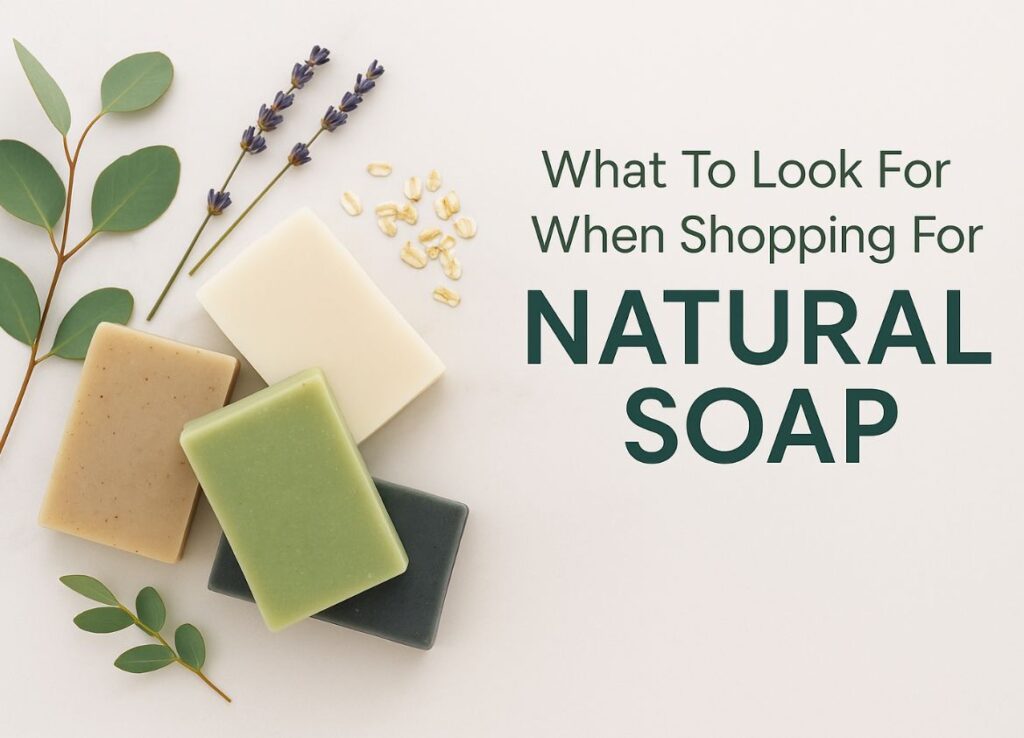
You’re choosing natural soap to be healthier and more eco-conscious. Don’t let wasteful packaging ruin that.
Why Packaging Matters
Most conventional soaps come wrapped in plastic that ends up in landfills or oceans. Natural soap brands often go the extra mile with sustainable packaging:
✅ Plastic-free wrapping (paper, cardboard, or no wrapper at all)
✅ Biodegradable materials (compostable labels and boxes)
✅ Minimal packaging (just the essentials, no excess waste)
✅ Refill programs (buy once, refill forever)
✅ Recyclable containers (if liquid soap, choose glass or aluminum)
Brands to Support
Look for companies that:
- Use zero-waste packaging
- Offset their carbon footprint
- Source ingredients sustainably
- Give back to environmental causes
Pro tip: Buy bar soap instead of liquid soap whenever possible. Bar soap uses less packaging, lasts longer, and doesn’t require plastic bottles.
Mistakes to Avoid When Buying Natural Soap
Even smart shoppers make these mistakes. Don’t be one of them.
Believing “All-Natural” Without Checking Ingredients
“All-natural” is not a regulated term. Companies can slap it on anything. Always read the ingredient list.
Choosing Soap Just by Scent
That amazing smell might come from synthetic fragrance, not essential oils. If the label says “fragrance” or “parfum” without specifying essential oils, it’s synthetic.
Forgetting Expiration Dates
Natural soap doesn’t last forever. Without synthetic preservatives, it typically has a shelf life of 1-2 years. Check for:
- Manufacturing or expiration dates
- Signs of rancidity (off smell, discoloration, oil spots)
Ignoring Your Skin’s Reaction
Just because a soap is natural doesn’t mean it’s right for your skin. If you experience irritation, dryness, or breakouts, switch formulas. You might be sensitive to a specific essential oil or ingredient.
Assuming All Handmade Soap Is High-Quality
Handmade doesn’t automatically mean good. Some artisans use cheap oils or don’t cure their soap properly. Look for reviews, certifications, and transparent ingredient lists.
Paying Too Much for Branding
Some brands charge premium prices for pretty packaging and marketing hype. Compare ingredient lists and find artisans who offer quality without the markup.
Best Places to Buy Authentic Natural Soap
Where you shop matters. Here’s where to find the real deal:
Farmer’s Markets
Pros: Meet the maker, ask questions, sample products, support local artisans
Cons: Limited selection, not always convenient
Artisan Shops & Health Food Stores
Pros: Curated selection, knowledgeable staff, often local brands
Cons: Higher prices than online
Trusted Online Eco-Stores
Pros: Wide variety, reviews, convenient, often better prices
Cons: Can’t smell or test before buying
Recommended online platforms:
- Etsy (search for cold process soap from verified sellers)
- Package Free Shop
- EarthHero
- Direct from artisan websites
🚩 Red Flags to Avoid
Watch out for:
- Vague ingredient lists (“natural fragrance blend” without specifics)
- No contact information or company details
- No certifications or third-party verification
- Prices that seem too good to be true
- Stock photos instead of real product images
- No reviews or all 5-star reviews (likely fake)
Pro tip: Start with small orders from new brands. Test a single bar before committing to bulk purchases.
FAQs About Shopping for Natural Soap
How do I know if a soap is truly natural?
Read the ingredient list. True natural soap will have recognizable plant-based ingredients like oils, butters, essential oils, and natural additives. Avoid anything with parabens, SLS, synthetic fragrances, or artificial dyes. Look for certifications like USDA Organic or EcoCert for extra assurance.
Does natural soap last as long as regular soap?
Natural soap typically lasts just as long—sometimes longer—if stored properly. Keep it in a well-draining soap dish away from direct water. Cold process soaps are denser and last longer than commercial bars. However, natural soap has a shorter shelf life (1-2 years) before use due to lack of synthetic preservatives.
Is natural soap good for sensitive skin?
Absolutely. Natural soap is often better for sensitive skin because it lacks harsh chemicals, synthetic fragrances, and irritating additives. Look for unscented options or soaps with soothing ingredients like oatmeal, goat milk, calendula, or chamomile. Always patch-test new soaps if you have very sensitive skin.
Why is natural soap more expensive?
Quality costs money. Natural soap uses premium plant-based ingredients, is handmade in small batches, takes 4-6 weeks to cure, and often comes from small artisans rather than mass manufacturers. You’re paying for better ingredients, ethical practices, and products that actually nourish your skin—not just strip it clean.
Can kids use natural soap?
Yes! Natural soap is generally safer for kids because it doesn’t contain harsh chemicals. Choose mild formulas with gentle ingredients like oatmeal, shea butter, or goat milk. Avoid soaps with strong essential oils or exfoliants. For babies under 6 months, consult your pediatrician first.
Final Thoughts on What to Look for When Shopping for Natural Soap
Let’s bring it home.
Knowing what to look for when shopping for natural soap gives you power. You stop falling for marketing hype and start making choices based on real ingredients, real benefits, and real values.
Here’s your quick checklist to take with you next time you shop:
✅ Your Natural Soap Shopping Checklist
Ingredients:
- Plant-based oils and butters (coconut, olive, shea)
- Natural additives (oatmeal, charcoal, essential oils)
- NO parabens, SLS, synthetic fragrances, or artificial dyes
Certifications:
- USDA Organic, EcoCert, Cruelty-Free, or Vegan labels
Skin Type Match:
- Dry skin → shea butter, olive oil, honey
- Oily skin → charcoal, tea tree, clay
- Sensitive skin → unscented, oatmeal, goat milk
Manufacturing:
- Cold process preferred (retains glycerin)
- Avoid commercial detergent bars
Packaging:
- Plastic-free or minimal packaging
- Biodegradable or recyclable materials
Source:
- Farmer’s markets, artisan shops, or trusted online stores
- Transparent ingredient lists and company info
- Positive reviews from real customers
Next time you’re shopping, keep this checklist handy to ensure you’re choosing a safe, eco-friendly natural soap that’s perfect for your skin.
Stop wasting money on chemical-loaded garbage. Start investing in products that actually work.

